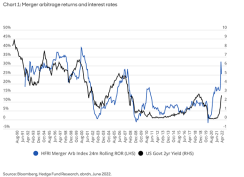Despite high inflation and rising interest rates, it’s important to remember that even with the Fed’s hiking cycle interest rates are still relatively low. In addition, even though equity market selloffs have been common, equity multiples are still relatively high.
It has been a (very) long time since the Fed raised rates absent an above-average growth backdrop. When rates rise but growth is strong, equities tend to do well. But right now, growth isn’t strong, and rates are rising in a bid to tame inflation. While these conditions threaten traditional portfolios, they may create opportunities for hedge fund investors seeking to fill the gaps.
“Current market dynamics make it hard for traditional 60/40 portfolios to generate returns, leaving investors searching for alternatives,” says Darren Wolf, Global Head of Investments, Alternative Investment Strategies, abrdn. “As an asset class, hedge funds have historically done well in challenging market environments similar to the one we’re in right now.”
The case for hedge funds
Hedge funds could be a compelling answer to today’s uncertain markets chiefly because they’re so flexible. Hedge funds can invest both long and short, so investors aren’t taking a directional bet on whether the markets will go a certain way. Other asset classes have more binary outcomes.Hedge funds can also employ derivatives and options, which don’t typically factor into traditional asset classes. These nontraditional tools can help investors manage risk and seek higher returns – important considerations in a volatile environment where good returns are hard to find.
“Hedge funds also have a more fluid structure than, say, an equity mutual fund. They can migrate between asset classes, a flexibility that other pools of capital lack,” says Wolf.
The Fed has introduced an interest-rate hiking cycle in an effort to rein in persistently rising inflation. Rising interest rates directly impact a variety of hedge fund spread-based arbitrage trading strategies. When interest rates increase, arbitrage spreads widen, thus increasing an investor’s expected return.
Merger arbitrage
“The rising-interest-rate landscape could bode well for a few different hedge fund strategies, such as merger arbitrage. In fact, it’s one of the few asset classes that’s yielded a positive correlation with interest rate. As rates continue to rise, the spreads on deals and rates of return could increase,” says Wolf.
Merger arbitrage has promise beyond its relationship with rising interest rates. As a sector, it adjusted well to increased regulatory scrutiny – and there’s a backlog of deals that didn’t close in 2021 but could present opportunities in the future.
Fixed-income relative value
Rising interest rates also set up the fixed-income relative value subsector of the hedge fund universe for potential success.“When rates rise, the same shift in the yield curve at a lower level will lead to a more magnified move at higher levels. So fixed-income relative value spreads tend to widen out to more attractive levels,” says Wolf.
As a result of what Wolf describes, investors may be able to get the returns they’re seeking with less leverage than a strategy may have used in the past. Or, if leverage stays constant, the investor’s return would likely increase.
On top of this, many hedge fund strategies – but fixed-income relative value in particular – use derivatives to express investment goals. This means they tend to hold a significant amount of unencumbered cash across their portfolios. Before this interest-rate hiking cycle, there would have been virtually a 0% return on this cash.
“With rates ratcheting up, cash can earn a return too,” says Wolf. “It isn’t necessarily a huge part of fixed-income relative value returns, but it’s favorable for investors all the same.”
One last development adding to the case for hedge funds is the advent of investable hedge fund indices. Historically investors have had to allocate a significant amount of time and cost to perform manager due diligence. Hedge Funds’ inherent flexibility is a double-edged sword in that while it makes them attractive for the current environment, it also drives significant dispersion in returns between managers. So an investor can make the right decision about a sub-strategy, but they also need the hedge fund they have chosen to perform as anticipated. The ability to replicate hedge fund indices and their sub-strategies by directly investing in the funds changes that.
Learn more about how hedge funds can help battle rising rates and inflation.
IMPORTANT INFORMATION
FOR INVESTMENT PROFESSIONAL USE ONLY – NOT FOR PUBLIC DISTRIBUTION
PAST PERFORMANCE IS NOT AN INDICATION OF FUTURE RESULTS
Alternative investments involve specific risks that may be greater than those associated with traditional investments; are not suitable for all clients; and intended for experienced and sophisticated investors who meet specific suitability requirements and are willing to bear the high economic risks of the investment. Investments of this type may engage in speculative investment practices; carry additional risk of loss, including possibility of partial or total loss of invested capital, due to the nature and volatility of the underlying investments; and are generally considered to be illiquid due to restrictive repurchase procedures. These investments may also involve different regulatory and reporting requirements, complex tax structures, and delays in distributing important tax information.
The information contained herein is intended to be of general interest only and does not constitute legal or tax advice. abrdn does not warrant the accuracy, adequacy or completeness of the information and materials contained in this document and expressly disclaims liability for errors or omissions in such information and materials. abrdn reserves the right to make changes and corrections to its opinions expressed in this document at any time, without notice. Some of the information in this document may contain projections or other forward-looking statements regarding future events or future financial performance of countries, markets or companies. These statements are only predictions and actual events or results may differ materially. The reader must make his/her own assessment of the relevance, accuracy and adequacy of the information contained in this document, and make such independent investigations as he/she may consider necessary or appropriate for the purpose of such assessment.
Any opinion or estimate contained in this document is made on a general basis and is not to be relied on by the reader as advice. Neither abrdn nor any of its agents have given any consideration to nor have they made any investigation of the investment objectives, financial situation or particular need of the reader, any specific person or group of persons. Accordingly, no warranty whatsoever is given and no liability whatsoever is accepted for any loss arising whether directly or indirectly as a result of the reader, any person or group of persons acting on any information, opinion or estimate contained in this document.
In the United States, abrdn is the marketing name for the following affiliated, registered investment advisers: abrdn Inc., Aberdeen Asset Managers Ltd., abrdn Australia Limited, abrdn Asia Limited, Aberdeen Capital Management, LLC, abrdn ETFs Advisors LLC and Aberdeen Standard Alternative Funds Limited.abrdn is the registered marketing name in Canada for the following entities: abrdn Canada Limited, abrdn Investments Luxembourg S.A., abrdn Private Equity (Europe) Limited, abrdn Capital Partners LLP, abrdn Investment Management Limited, Aberdeen Standard Alternative Funds Limited, and Aberdeen Capital Management LLC. abrdn Canada Limited is registered as a Portfolio Manager and Exempt Market Dealer in all provinces and territories of Canada as well as an Investment Fund Manager in the provinces of Ontario, Quebec, and Newfoundland and Labrador.
US-130123-186461-1






